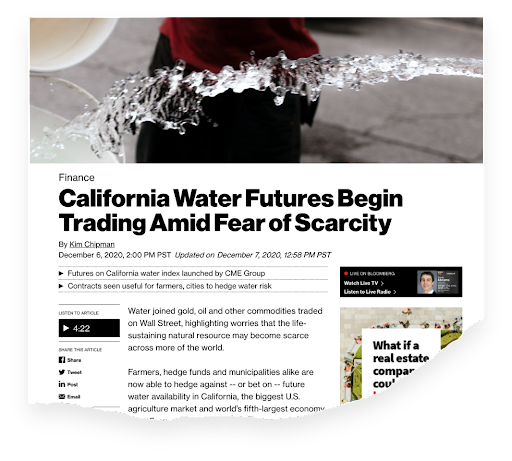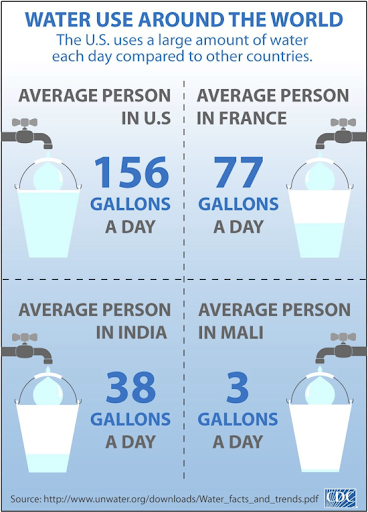In 2012, California took the bold step of enacting AB 685, which declared that every person in the state has a right to clean, safe, and affordable drinking water. Seven years later, in 2019, Gov. Newsom signed SB 200 to provide funding to “provide safe drinking water in every California community, for every Californian.” Despite these efforts, more than a million Californians today lack access to clean safe affordable drinking water, and millions of people across the U.S. can’t afford water as bills have risen 80 percent in a decade.
Our state should aim to source 100 percent local and reliable water in Southern California, and we can do so if we invest in sustainable solutions like: stormwater and rainwater capture, water recycling efficiency, industrial reuse, and recharging groundwater, aquifers, and greywater systems. All of these sustainable solutions use significantly less energy than desalination, which has been promoted by water privatizers as a solution to the climate-driven long-term drought.
Pressure is building on Wall Street from privatizers, polluters, and financiers to keep commodifying public resources, especially water. Commodification occurs when a private entity attempts to turn a public good into a product from which “owners” can extract profits at the expense of the public. This is exactly what the developers who build desalination plants want to do with the sea water. It opens public goods like water to futures trading, allowing speculators to bet on the future price of a commodity and higher rates for the average user of that commodity. This trend to commodify water does not align with the state’s Human Right to Water. Imagine shorting water futures the way Wall Street shorted the housing market in 2008? That’s the kind of disaster we don’t need.

As California goes, so goes the nation. If the California Coastal Commission grants Brookfield-Poseidon a permit to build its dangerous desalination plant in Huntington Beach, it could set a precedent for the entire nation where private corporations profit and privatize ocean water AND drinking water at our expense.
Ocean desalination is the most expensive way to source water. It is the most energy intensive and environmentally devastating, even more so once you factor in sea level rise. It must always be considered the last resort. In the case of the proposed Brookfield-Poseidon Huntington Beach desalination plant, it is also the most risky according to a study by the Municipal Water District of Orange County. The University of California Los Angeles Luskin study found that the Brookfield-Poseidon plant would hurt low-income families in North Orange County by raising their already high water rates.
For each gallon of desalinated water the plant produces, about one and a half gallons of super concentrated brine is discharged into the ocean, along with toxic chemicals. The concentrated brine threatens the coastal ecosystem by decreasing oxygen in the water, suffocating marine life, and creating ‘dead zones’ near the coast.

Despite having environmental justice and Tribal consultation policies, many regulatory agencies are still failing to protect communities that have been affected historically by environmental racism and inequality. Brookfield-Poseidon is a $650 billion entity, and uses its egregious profits to hire an army of lobbyists to convince us all that the Pacific Ocean is an “endless reservoir” instead of a fragile ecosystem that must be protected. Low-income and communities of color are unable to hire professional lobbyists to push back against this false narrative about ocean desalination being an innovative solution to fight the drought. As a result, working Californians do not get the same kind of access to decision makers that multibillion dollar corporations like Brookfield-Poseidon do.
For water privatizers, desalination is solely about the profits, they don’t care about the dead zones or livelihoods they destroy with their fish-killing, climate-wrecking machines. It is also not their concern that 16,000 non-recyclable reverse osmosis plastic membranes used to desalinate the water will likely end up in a landfill or incinerator.
Now is the time to invest in efficiency, from changing our building codes to stop flushing toilets with potable (drinking) water and in water leak detection systems to ensure the 17 percent water losses in urban centers is curtailed. The cheapest gallon of water is the one we don’t have to source. We aren’t even attempting to maximize all of the tools and resources that we have to safeguard the water we already have access to. By implementing water efficient policies, we can conserve our most precious resource and signal to corporate speculators and traders that we don’t need their polluting desalination plants.
Andrea is the Climate Action Director of Azul
Azul is a grassroots organization working with the Latinx community to conserve marine resources.Founded in 2011, Azul has developed and executed campaigns that achieved groundbreaking ocean conservation policy victories in California.

